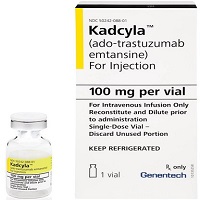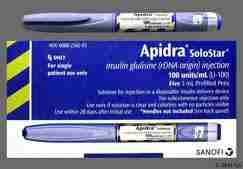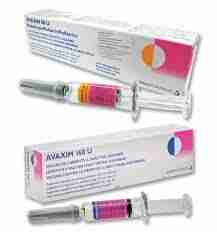



Kadcyla IV Infusion 100 mg/vial
Share in Social Media
Indications
Metastatic Breast Cancer (MBC): Trastuzumab Emtansine, as a single agent, is indicated for the treatment of patients with HER2-positive, unresectable locally advanced or metastatic breast cancer who have received prior treatment with trastuzumab and a taxane.
Pharmacology
Trastuzumab Emtansine is a HER2-targeted antibody-drug conjugate which contains the humanized anti-HER2 IgG1, trastuzumab, covalently linked to the microtubule inhibitory drug DM1 (a maytansine derivative) via the stable thioether linker MCC (4-[N-maleimidomethyl] cyclohexane-1-carboxylate). Emtansine refers to the MCC-DM1 complex. An average of 3.5 DM1 molecules are conjugated to each molecule of trastuzumab.
Conjugation of DM1 to trastuzumab confers selectivity of the cytotoxic agent for HER2-overexpressing tumor cells, thereby increasing intracellular delivery of DM1 directly to malignant cells. Upon binding to HER2, trastuzumab emtansine undergoes receptor-mediated internalization and subsequent lysosomal degradation, resulting in release of DM1-containing cytotoxic catabolites (primarily lysine-MCC-DM1).
Trastuzumab Emtansine has the mechanisms of action of both trastuzumab and DM1.
Trastuzumab emtansine, like trastuzumab, binds to domain IV of the HER2 extracellular domain (ECD), as well as to Fcγ receptors and complement C1q. In addition, Trastuzumab Emtansine, like trastuzumab, inhibits shedding of the HER2 ECD, inhibits signaling through the phosphatidylinositol 3-kinase (PI3-K) pathway, and mediates antibody-dependent cell-mediated cytotoxicity (ADCC) in human breast cancer cells that overexpress HER2.
DM1, the cytotoxic drug component of Trastuzumab Emtansine, binds to tubulin. By inhibiting tubulin polymerization, both DM1 and Trastuzumab Emtansine cause cells to arrest in the G2/M phase of the cell cycle, ultimately leading to apoptotic cell death. Results from in vitro cytotoxicity assays show that DM1 is 20–200 times more potent than taxanes and vinca alkaloids.
The MCC linker is designed to limit systemic release and increase targeted delivery of DM1, as demonstrated by detection of very low levels of free DM1 in plasma







